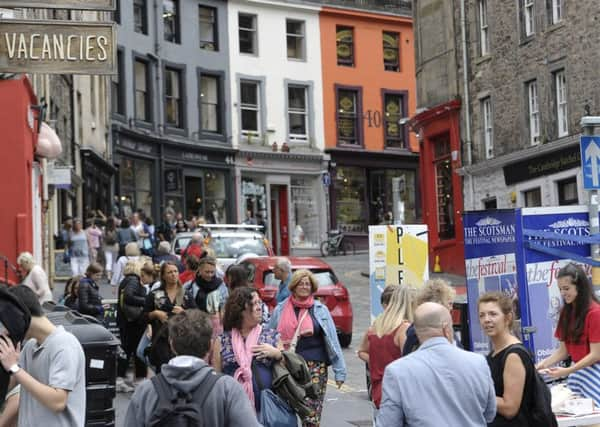Call for longer Edinburgh festival to ease room cost crisis


They claim the move would bring down prices in August when visitors face paying upwards of £400 to secure a room.
The Edinburgh Hotels Association has called for action to be taken to ensure the city becomes a “true year-round destination” in future years.
Advertisement
Hide AdAdvertisement
Hide AdThe body claims the city’s tourism infrastructure is under mounting pressure in August because there is “very high demand for a limited supply of accommodation”.
Last week property experts warned a shortage of hotel rooms in August was fuelling the city’s controversial Airbnb market, which has soared to more than 1.1 million overnight stays – 20 per cent of the visitor market in the city.
Airbnb has revealed 120,000 visitors to the August festivals have booked via its site, earning hosts around £15 million.
The industry body has spoken out in the wake of warnings from Fringe chief executive Shona McCarthy that the “life-force” of the city’s festivals faces being killed off due to the cost of staying in the city in August.
She has called for a “city-wide effort and commitment” to help curb the cost of staying in Edinburgh in August.
Edinburgh’s jazz and film festivals have moved out of their traditional August slots in recent years, partly due to the soaring costs of staging the events in the peak period.
Russell Imrie, spokesman for the Hotels Association, said “extending the timeframe” of Edinburgh’s festivals in the calendar would create a “smoother demand curve” outwith August.
Advertisement
Hide AdAdvertisement
Hide AdHe said: “August is super peak month in Edinburgh as a result of tourists – UK and international – visiting Edinburgh to attend the Edinburgh Military Tattoo, the Edinburgh International Festival and the Edinburgh Festival Fringe.
“In addition, believe it or not, there are tourists who visit Edinburgh in August without attending any of the festivals and are either mainly having a city break or are visiting Edinburgh during a visit to Scotland.
“The high tourist numbers result in very high demand for a limited supply of accommodation. The basic laws of supply and demand result in flexible pricing to a level which the customer is willing to pay.
“In the same way that demand drives pricing in August upwards, it drives pricing in winter downwards as there is lower demand for the fixed supply of accommodation and market forces cause suppliers to reduce prices to tempt buyers.
“Turning to August, it is clear that if demand was reduced, the laws of supply and demand would result in lower accommodation prices.
“Holding all festivals in a three-week period creates high demand, so spreading this out through July and August would smooth demand... the target for all should be for the city to have a spread of events throughout the year, which avoids too many large events at the same time. This would result in a sustainable tourism industry with pricing which avoids high peaks and low troughs.”
Research carried out by the Edinburgh Festival Fringe Society in recent months has found the cost of accommodation in the city in August is the biggest single barrier to participation in the event.
Advertisement
Hide AdAdvertisement
Hide AdHowever, Imrie said: “Edinburgh has been highly successful in developing its tourism industry and Edinburgh is a must-see city for most visitors to Scotland. This creates high demand. There is no such thing as a ‘normal price’ from which hotels raise their prices. Prices are simply a reflection of demand. Compared with other European capital cities, Edinburgh is not achieving the occupancy or room rates of other capital cities.”